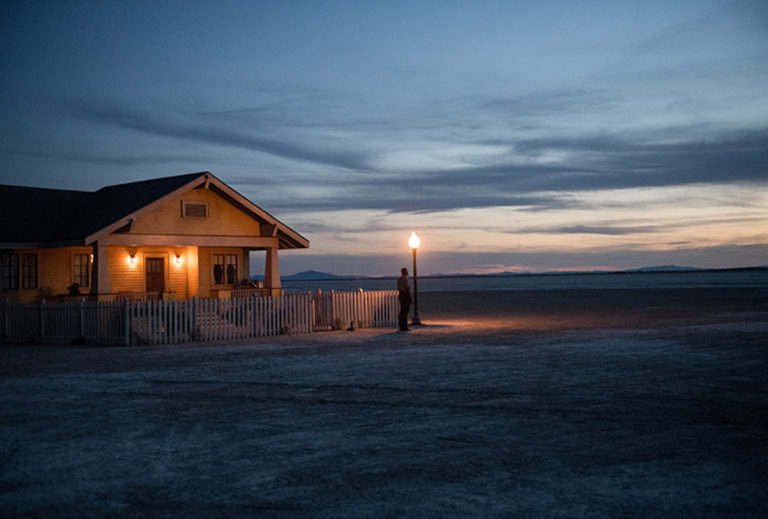Nine Days (2020 | USA | 124 Minutes | Edson Oda)
So much of literature, cinema, and religion contemplate the afterlife. What happens to us when we die, where do we go, how are our lives judged? Less spiritual attention — at least in the west — is paid to how and why we get to be alive on this planet in the first place. Something must be in the air: just as Pixar’s holiday release Soul introduced The Great Before as the first episode in a trilogy ending with the Great Beyond, Edson Oda’s festival favorite Nine Days contemplates a process by which souls come to inhabit a life on Earth.
Unsurprisingly, the films take considerably different approaches (and budgets). Where Pete Docter imagined a pastel-hued animated wonderland of little blobs completing their merit badges under the tutelage of cubist line drawings caretakers until they were qualified to take the plunge into real life, Oda gives us a quiet reality competition set in a small house in the middle of a vast white sand desert. There, a solitary man called Will (played with melancholy seriousness by Winston Duke) spends eternity watching, recording, and logging the highlights of a steady-stream of live POV broadcasts of individual earthly lives on a wall of old televisions. Sometimes, for big life events, his neighbor Kyo (Benedict Wong) drops by for a drink and keeps him company. When one of those sets tragically cuts to black, it opens the door to choosing a new contestant on The Life is Right via a very solemn selection process.
Souls emerge, hours-old but fully-formed adults neither alive nor dead, from the ether on Will’s front porch to be “considered for the amazing opportunity of life”. He informs them that should they be selected, they will “have the chance to be born in a fruitful environment” where they can “grow, develop, and accomplish”. Each of the candidates accepts the challenge of spending up to the title nine days of an ambiguous review process in which they’re subjected to thought experiments, allowed to spend the days observing the wall of televisions, asked open-ended questions, and are asked to make notes of moments that register as particularly good or bad.
The contenders would have made a great cast fit for a grown-up season of the Real World, but they rarely interact and have their emotional registers dampened in this plane of pre-existence. Arianna Ortiz is sensitive and thoughtful Maria, David Rysdahl is the tender-hearted Mike who spends most of his time drawing beautiful pictures of beaches. They have nice moments, but anyone who’s seen a season of Survivor will have their money on the trio of Tony Hale as a chill indifferent Alexander who just wants to crack a beer and throw a barbecue, Bill Skarsgård as the confrontational and confident Kane, and Zazie Beetz as the precocious, whimsical, and carefully observant Emma who arrives just under the deadline. In each of their own ways, they challenge Will’s sensibilities.
As Will evaluates each of these fresh souls, we gradually assemble bits and pieces of the story underlying his cool detached demeanor. He bears the rare burden of having already been alive, bringing his firsthand knowledge of the turmoils of a life-lived to his decision-making, as well as the constant ache of being charged to an eternity of observation and cosmic bureaucracy. As the field is slimmed, through flickering disappearances or more ornate heartbreaking send-offs, we also watch as he struggles to understand what went wrong to create this opening to send a new soul into existence anyway.
The inspired, if modest, set design creates a well worn stage as we get a feeling for what Will might be seeking in his decision-making. And though Winston Duke’s soulful performance as arbiter and cog-in-the-wheel of fate is what holds this long speculative exercise chamber piece, Antonio Pinto’s spare but evocative string-centric soundtrack does an incredible amount of heavy-lifting in terms. As the strings soar and flutter, the original compositions pair with soft, inventive, cinematography convey a sense of mystery, longing, and gravitas.
By their very nature, we don’t get to know very much about the applicants. They’re days-old and still figuring it out, which makes for what feels like a series of acting exercises, albeit often engaging ones in which a talented cast conjure relatable (if archetypical) performances from fairly limited material. As the interview period approaches its culmination, the stakes emerge as a choice along a spectrum of starry optimism, indifference, and what I’d call realism (others might call it cynicism or pessimism, but I’ll tip my cards by saying that terminology feels to judgmental for this particular observer). Will and Keo fight over the best choice, there’s a lovely dinner among the finalists, an ultimate selection is made, and the aftermath of a stirring (if over-reaching) finale everyone learns something about themselves in the end. It’s kind of hokey, lingers for a bit too long and threatens to get crushed under its own weight, but also sort of beautiful.
Although the outline fits the mold of a jaunty competition, it’s really a delicate, two-hour long contemplation. I watched Nine Days partially on an airplane and partially between long weather-delayed flights; so I admittedly may have been in an especially receptive mood for a pre-gatorial premise and more tolerant of a movie whose broad gestures didn’t entirely live up to the deep philosophical questions. Later, the mechanics of this accomplished debut began to nag, but maybe it was a wise decision to lean into mood and leave the details scant. Is everyone on our planet observed by a different Will, each with his or her own motivations? Are we all part of a long, sad, game of cosmic chess? What was the point of any of it? As with life itself, that’s the question, isn’t it?
Nearly a year and a half since its Sundance premiere, Nine Days arrived in US theaters in August 6 2021.



